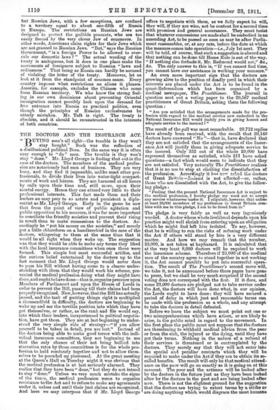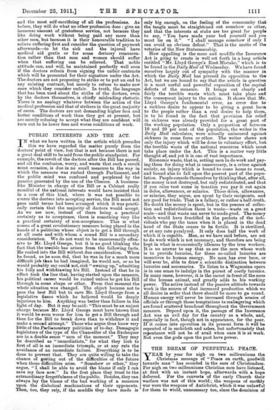THE DOCTORS AND THE INSURANCE ACT. "B UYING men's all right—the
trouble is they won't stay bought." Such was the reflection of a disillusioned political Boss. In the same way it is often easy enough to " do " men. The trouble is they won't stay " done." Mr. Lloyd George is finding that out in the case of the doctors. The members of the medical profes- sion are notoriously bad men of business. They are very busy, and they find it impossible, unlike most other pro- fessionals, to divide their lives into water-tight compart- ments of work and leisure. They are harassed at all hours by calls upon their time and, still more, upon their mental energy. Hence they can attend very little to their professional interests. This fact made them and their leaders an easy prey to so astute and persistent a diplo- matist as Mr. Lloyd George. Early in the game he saw that from the point of view of public agitation and public opposition to his measure, it was far more important to conciliate the friendly societies and prevent their rising in revolt than to make concessions to the doctors. Ac- cordingly he " put his money on the societies," and merely put a little chloroform on a handkerchief in the case of the doctors, whispering to them at the same time that it would be all right when they woke up. The suggestion as that they would be able to make any terms they liked with the local insurance committees when once these were formed. This simple but most successful artifice, and the curious belief entertained by the doctors up to the last moment that Mr. Lloyd George would never dare to pass his Bill without having come to a clearer under- standing with them that they would work his scheme, pre- vented the medical profession doing what they might have done, and oughtto have done—that is,organize pressure upon Members of Parliament and upon the House of Lords in order to prevent the Bill, passing till their claims had been properly recognized. Now, however, that the Bill has actually passed, and the task of putting things right is multiplied a thousandfold in difficulty, the doctors are beginning to wake up and see the terrible position into which they have got themselves, or rather, as the rank and file would say, into which their leaders, inexperienced in political negotia- tion, have got them. They are at last beginning to under- stand the very simple rule of strategy—" if you allow yourself to be taken in detail, you are lost." Instead of the doctors being able to make good terms with the indi- vidual insurance committees, they are beginning to see that the only chance of their not being bullied into starvation rates by those committees is for the whole pro- fession to hold resolutely together and not to allow them- selves to be pounded up piecemeal. At the great meeting at the Queen's Hall on Tuesday night it was obvious that the medical profession is at last seriously alarmed. They realize that they have been" done," but they do not intend to stay "done." Unless we very much mistake the signs of the times, the medical profession mean to organize resistance to the Act and to refuse to make any agreements under it, unless and until their just claims are recognized. And here we may interpose that if Mr. Lloyd George offers to negotiate with them, as we fully expect he will) they will, if they are wise, not be content for a second time with promises and general assurances. They must insist that whatever concessions are made shall be embodied in an amending Act, to be passed as soon as may be after Parlia- ment reassembles, or, at any rate, before the date at which the measure comes into operation—i.e., July let next. They will be told, of course, that such a suggestion is absurd and that nothing can be done till Home Rule is out of the way. " If nothing else forbade it, Mr. Redmond would not," &c., &c. The only answer to this is, "If you cannot find time, you cannot have our assistance in working your measure." An even more important sign that the doctors are growing alive to the position of deadly peril in which their interests are placed under the Act is to be found in the quasi-Referendum which has been organized by a medical newspaper, The Practitioner. The journal in question sent out a voting paper to the 29,567 medical practitioners of Great Britain, asking them the following question :
"Are you satisfied that the arrangements made for the pro- fession with regard to the medical service now embodied in the National Insurance Bill would justify you in giving honest and adequate service to the insured ? "
The result of the poll was most remarkable. 20,712 replies have already been received, with the result that 20,149 doctors have answered " No "—that is, have declared that they are not satisfied that the arrangements of the Insur- ance Act will justify them in giving adequate service to the insured. Only 352 out of the whole 29,000 have expressed themselves as satisfied, while 211 have asked questions—a fact which would seem to indicate that they are not satisfied. Very naturally The Practitioner realizes that it is no use to stop at eliciting the dissatisfaction of the profession. Accordingly it has neee tehoel. the doctors of Great Britain—ii amt is not affected—or, rather, those who are dissatisfied with the Act, to give the follow- ing pledge :
"Feeling that the present National Insurance Act is unjust to the medical profession, I hereby pledge my word not to accept any service whatsoever under it. I stipulate, however, that unless at least 23,000 members of my profession in Great Britain com- bine with me in this pledge, I am to be freed from it."
The pledge is very fairly as well as very ingeniously worded. A doctor whose whole livelihood depends upon his practice might well shrink from entering upon an obligation which he might find left him isolated. To say, however, that he is willing to run the risks of refusing work under the Act if others will stand by him is a very different matter. And here we may remark that the number, 23,000, is not taken at haphazard. It is calculated that at the very least 8,000 doctors will be required to work the insurance scheme. Therefore if 23,000 of the medical men of the country agree to stand together in not working it, the Act cannot possibly be put into successful opera- tion. The result of The Practitioner's second move will, we take it, not be announced before these pages have gone to press, but we shall be very much surprised if the second voting does not correspond with the first. If it does, and some 28,000 doctors are pledged not to take service under the Act, the doctors will have done what, in our opinion, the Lords ought to have done : they will have secured a 'prod of delay in which just and reasonable terms can be made with the profession as a whole, and any attempt to take the doctors in detail defeated.
Before we leave the subject we must point out one or two misapprehensions which have arisen, or are likely to arise, in the public mind. in regard to the movement. In the first place the public must not suppose that the doctors are threatening to withhold medical advice from the poor or from the sick, the injured or the dying, until they have got their terms. Nothing in the nature of a refusal of their services is threatened or is contemplated by the doctors. They merely say that they will not enter into the special and peculiar contracts which they will be required to make under the Act if they are to obtain its so- called benefits. The result will only be that medical attend- ance on the poor will go on exactly as it is going on at this moment. The poor and the artisans lain be looked after by the doctors in the future just as they have been looked after by the doctors in the past and are being looked after now. There is not the slightest ground for the suggestion that the doctors are tying to extort terms by a strike or are doing anything which would disgrace the most humane and the most self-sacrificing of all the professions. As before, they will do what no other profession does : give an immense amount of gratuitous service, not because they like doing work without being paid. any more than other men, but because it is their honourable tradition to relieve suffering first and consider the question of payment afterwards—to let the sick and the injured have medical aid gratis or for some derisory remunera- tion rather than that men and women should suffer when that suffering can be relieved. That noble attitude can, and will, be maintained perfectly well even if the doctors refrain from signing the unfair contracts which will be presented for their signature under the Act. The doctors are not proposing to strike or to put an end to any existing contract, but merely to refuse to make new ones which they consider unfair. In truth, the language that has been used about the strike of the doctors, even by the doctors themselves, is chiefly misleading rhetoric. There is no analogy whatever between the action of the medical profession and that of strikers in the great majority of cases. The doctors are not demanding higher fees and better conditions of work than they get at present, but are merely refusing to accept what they are confident will turn out to be lower fees and worse conditions of work.



































 Previous page
Previous page